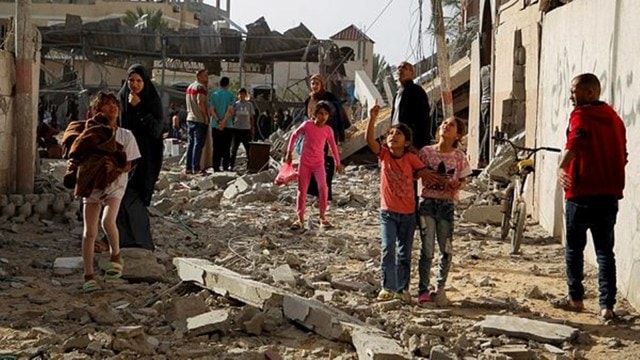 In recent weeks, after Israel faced mounting global pressure to improve dire conditions there, more aid has flowed into the area. (Reuters photo)
In recent weeks, after Israel faced mounting global pressure to improve dire conditions there, more aid has flowed into the area. (Reuters photo)The leader of the World Food Program said parts of the Gaza Strip are experiencing a “full-blown famine” that is spreading across the territory after almost seven months of war that have made delivering aid extremely challenging.
“There is famine — full-blown famine in the north, and it’s moving its way south,” Cindy McCain, the program’s director, said in excerpts released late Friday of an interview with “Meet The Press.”
McCain is the second high-profile American leading a US government or UN aid effort who has said there is famine in northern Gaza, although her remarks do not constitute an official declaration, which is a complex bureaucratic process.
She said her assessment was “based on what we have seen and what we have experienced on the ground.”
The hunger crisis is most severe in the strip’s northern section, a largely lawless and gang-ridden area where the Israeli military exercises little or no control. In recent weeks, after Israel faced mounting global pressure to improve dire conditions there, more aid has flowed into the area.

On the diplomatic front, negotiations resumed in Cairo on Saturday aimed at reaching a cease-fire and an agreement to release Israeli hostages and Palestinian prisoners. A delegation of Hamas leaders traveled to the Egyptian capital, the Palestinian armed group said.
Over the past few days, Israel and mediators in the talks — Egypt, Qatar and the United States — have awaited Hamas’ response to the latest cease-fire proposal, with Hamas signaling that it was open to discussing the Israeli-approved offer. On Friday, Secretary of State Antony Blinken said US officials were waiting to see if Hamas “can take ‘yes’ for an answer on the cease-fire and the release of hostages.”
Husam Badran, a senior Hamas official, said in a text message that the group’s representatives came to Cairo “with great positivity” toward the proposed deal.
As of Saturday, Israel had not dispatched a delegation to Cairo to engage in indirect negotiations with Hamas officials, as Israeli officials had done in previous rounds of talks, according to two Israeli officials who, following diplomatic protocol, spoke on the condition of anonymity.
 Earn Coin
Earn Coin Mining
Mining
 Play Games
Play Games




 Spin Wheel
Spin Wheel Miner
Miner Play & Win
Play & Win